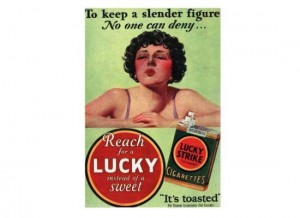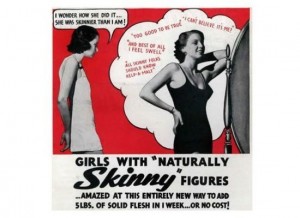Would Don Draper approve these messages? With Mad Men’s season five premiere bringing everyone’s favorite vintage show back to television on Sunday, we decided to take a look back at the ads that influenced our dieting styles and body images over the years.
It’s easy to think of the current glut of half-baked weight loss solutions as a modern phenomenon. But these vintage advertisements for the wacky weight loss “cures” of yesteryear prove that snake oil and pseudo-science are not a 21st century invention.
- Eat Sugar To Lose Weight
“When you’re hungry, it usually means your energy is down,” reasons this ad from sugar manufacturers that was in circulation in the early 1970s. “By eating something with sugar in it, you can get your energy up fast.”
They advertised sugar as only 18 calories per teaspoon and “all energy.” Of course, they neglected to mention that immediately after creating a surge of energy, unfettered sugar consumption leads to a blood sugar crash that triggers appetite and brings on fatigue.
- Curb Appetite With Cigarettes
We don’t need to review the damaging effects of cigarettes, do we? Smoking is associated with heart disease, stroke, many different cancers, and emphysema and other respiratory diseases – just to name a few. In fact, smoking remains the number one preventable cause of death in the United States, killing 393,000 Americans each year.
This 1929 advertisement for Lucky Strike cigarettes reveals how tobacco products were marketed to women primarily as a weight loss aid.
- Change Your Natural Body To Fit Beauty Ideals
A good reminder that unrealistic body ideals skew in both directions, this was one in a series of advertisements for slender young women who wanted the voluptuous figure in fashion at the time.
Nothing wrong with a “naturally skinny figure” – or a naturally any-kind-of figure, for that matter.
Article taken in part from www.huffingtonpost.com
Disclaimer
All content on this website is provided for general information only, and should not be treated as a substitute for the medical advice of your own doctor or any other health care professional. Always consult your own GP if you’re in any way concerned about your health.


